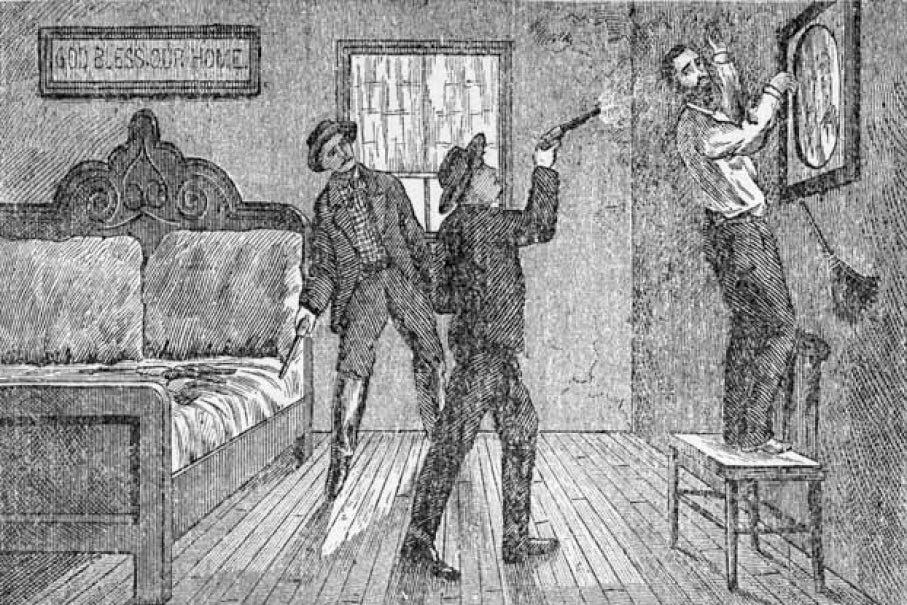Why Do We Love Outlaws?
Jesse James was a lad that killed many a man,
He robbed the Glendale train,
He stole from the rich and he gave to the poor,
He'd a hand and a heart and a brain.-“Jesse James” (traditional folk song)
To-day all is changed, and Al is the half-acknowledged national hero. At present he is suffering from that almost universal ailment, contempt of court, and everybody sympathizes with him. Why the change? Perhaps it is merely the national weakness for worshipping success.
-“Capone, King of Crime” (Vanity Fair, May 1931)
Such as it is, the consistency of human characters is due to the words upon which all human experiences are strung. We are purposeful because we can describe our feelings in rememberable words, can justify and rationalize our desires in terms of some kind of argument. Faced by an enemy we do not allow an itch to distract us from our emotions; the mere word “enemy” is enough to keep us reminded of our hatred, to convince us that we do well to be angry.
-Aldous Huxley, “Words and Behavior”
“A lad that killed many a man”
The historical Jesse James was a serial murderer and white supremacist.
Born to a slaveholding family, James joined what could be described as a pro-Confederate terror group under “Bloody Bill” Anderson and participated in a campaign of violence during the war (including a massacre of unarmed Union soldiers) that he continued long after the war ended.
The myth of Jesse James as a kind of Robin Hood seems to be largely self-created, and the victims of his robberies were often unarmed and/ or working class, people doing their jobs and minding their business.
James was a violent criminal who presented himself as a victim of persecution by the law. His gang killed unarmed bank employees and bystanders; one botched Minnesota bank robbery was ended when the townspeople rose up and violently defended the bank and town from the James-Younger gang. At least two townspeople— a bank clerk and a resident who didn’t speak English and couldn’t understand the gang’s orders— died in the shootout.
Yet James and his gang also enjoyed significant popularity in post-Civil War America, and after James’ death, his brother Frank ultimately escaped multiple attempts to hold him legally responsible for his crimes.
Ron Hansen, author of a popular historical fiction about James, has called him “a fascinating, emotionally complex, and frequently charming man who could also be a cold-blooded psychopath”.
James’ artistic transformation into a folk hero may speak to a tendency in American culture to search for heroism in basic lawlessness, and to conflate self-interested criminality with bold anti-authoritarianism.
“Pitchfork” Ben
In his embrace of murderous Lost Cause terror, James brings to mind South Carolina’s “Pitchfork” Ben Tillman, who joined the Red Shirts (essentially the Ku Klux Klan without the robes— the Klan having been driven underground during the era) and participated in the Hamburg Massacre, which involved the murder of multiple members of a Black state militia (echoing James’ participation in the massacre of Union soldiers).
Like James, Tillman in many ways rewarded for his violence, and was later elected governor of South Carolina. He oversaw the creation of a state constitution which disenfranchised Black South Carolinians and rolled back much of the significant progress of the Reconstruction era. (It’s not a coincidence that the majority Black delegation which oversaw the creation of the previous constitution is responsible for bringing state-funded, truly public education to South Carolina for the first time, any more than it’s a coincidence that “former” Lost Causers like Oran Smith are at the forefront of undermining public schools now.)
So Good a [Lost] Cause (Part 1)
Note: this piece is Part 1 of a series. Part 2 can be found here. CW: Racism, white supremacy, racially-motivated terrorism and murder, racist language. Update: as predicted, Smith was confirmed.
To this day, Tillman’s statue is featured prominently in front of the SC State House, where it gazes at the Confederate memorial that is the first thing visitors see on approaching the State House from Gervais Street.
The plaque on Tillman’s statue mentions nothing about his time with the murderous Red Shirts.
“The great Al Capone”
Keep reading with a 7-day free trial
Subscribe to Other Duties (as assigned) to keep reading this post and get 7 days of free access to the full post archives.





![So Good a [Lost] Cause (Part 1)](https://substackcdn.com/image/fetch/$s_!PrYw!,w_1300,h_650,c_fill,f_auto,q_auto:good,fl_progressive:steep,g_auto/https%3A%2F%2Fsubstack-post-media.s3.amazonaws.com%2Fpublic%2Fimages%2F830e2e05-8460-4774-a7e3-360496d8e2e7_768x768.png)